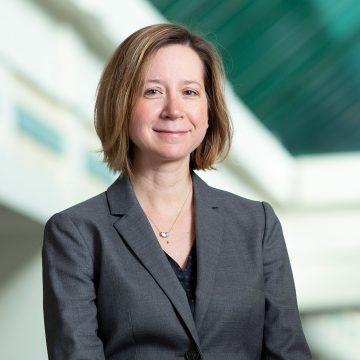Mary Jo Turk, PhD, has been named the O. Ross McIntyre, MD, Professor at the Geisel School of Medicine at Dartmouth. Turk, a professor of microbiology and immunology and co-director of the Immunology and Cancer Immunotherapy Program at Dartmouth’s Norris Cotton Cancer Center, joined the faculty of Dartmouth’s medical school 15 years ago and conducts pioneering research on the complex interactions between the immune system and cancer.
O. Ross McIntyre D ’53, MED ’55 was a founding member of Norris Cotton Cancer Center and served as its director from 1975 until his retirement in 1992. Under McIntyre’s leadership, the Cancer Center grew from a small enterprise to one of the nation’s premier Comprehensive Cancer Centers, as designated by the National Cancer Institute. He fostered an environment in which basic scientists, clinical researchers, and caregivers could collaborate, share resources, and advance each other’s work.

John Moran, MD, D ’54, MED ’55, a classmate of McIntyre’s at Dartmouth Medical School, initiated the effort to establish the chair in honor of McIntyre, and Steven Gillis, who earned his PhD at Dartmouth in 1978 and who knew McIntyre as a mentor and as a role model, contributed the lead gift with his wife, Anne.
“This is a wonderful recognition, and I am humbled by it,” says Turk. “Dr. McIntyre helped launch the immunotherapy program here, and pioneered our culture of collaborative research between clinicians and scientists. It’s a great honor to be appointed to the professorship that bears his name.”
Turk’s laboratory focuses on generating durable memory T cell responses to cancer. Her interest in this research began with the question of why patients with melanoma who develop vitiligo have such a good prognosis. Vitiligo is an autoimmune skin condition that targets normal healthy skin cells that produce pigment. Turk and her team found that memory T cells permanently reside in vitiligo-affected skin, where they kill melanoma cells. T cells that fight cancer had previously been thought to reside only in immune organs such as the spleen, lymph nodes, and blood.
“The immunotherapy program at Dartmouth has a strong and impressive heritage,” says Steven Leach, MD, director of the Cancer Center and the Preston T. and Virginia R. Kelsey Distinguished Chair in Cancer. “Mary Jo’s research is at the forefront of discovery into how the immune system can be harnessed to treat cancer. Her commitment to improving the lives of patients with melanoma is a fitting tribute to McIntyre’s legacy.”
Turk collaborates with Dartmouth-Hitchcock and Cancer Center clinicians, as well as other researchers in microbiology and immunology, quantitative biomedical sciences, and the Thayer School of Engineering. She notes that “Geisel fosters an unusually strong collaborative environment that is unmatched at other institutions.” She also mentors PhD students, junior faculty, and Dartmouth-Hitchcock clinicians.
“Our medical school’s historic interdisciplinary approach, exemplified by Mary Jo, sets Dartmouth apart from other academic immunotherapy programs and enables investigators to move quickly in taking research from the lab to the clinic,” says Duane Compton, PhD, dean of the Geisel School of Medicine. “This endowed professorship allows Mary Jo to pursue her vital work and dedicate time to teaching the next generation of cancer scientists and physicians.”
Turk has received research grants from a number of organizations including the National Institutes of Health, the American Cancer Society, the Melanoma Research Alliance, and the Sarcoma Foundation of America. She serves on the editorial board of International Immunopharmacology and is a member of the American Association of Immunologists and the Delta Kappa Gamma International Society of Key Women Educators. She received her PhD from Purdue University and completed her postdoctoral training at Memorial Sloan-Kettering Cancer Center.